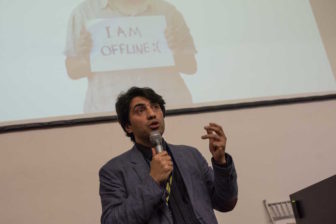
Azerbaijani journalist Emin Huseynov. Photo: Daylin Paul
There’s an empty chair where Ethiopian journalist, “X,” should be sitting, but he’s taken up a corner seat, out of sight from a camera. There’s clear instruction that he not be referenced on social media.
This is how the session on Reporting Under Repressive Regimes kicked off at GIJN on Thursday afternoon. X begins by saying that reporting in Ethiopia has been reduced to “cocktails and conferences:” journalists being invited for drinks and to parties hosted by government or conferences where government officials punt their spin and propaganda.
“There is growing self-censorship and a growing number of publications that are just propaganda for the government,” he says, showing front pages that are sunshine journalism and puff pieces.
Journalists in his country have to apply for access to report on so-called sensitive issues and government officials use stalling tactics to ensure an event or incident is over before the procedural boxes for access can be ticked.
X’s careful shielding of his identity is because the consequences for being a critical voice in Ethiopia are very real. It’s a chilling reality for journalists like X, as well as for Lawi Weng from Myanmar and Emin Huseynov from Azerbaijan, who made up the panel moderated by Keith Richburg, an American journalist and former foreign correspondent in China, another repressive regime for journalists.
Weng spent 67 days in prison this year, jailed for what the military called “unlawful association.” He is routinely labelled a “rebel journalist” for telling “negative” stories, including about the crisis of 600,000 fleeing Rohingya Muslims from Myanmar to Bangladesh.
Huseynov, who is also the chairman of the country’s leading media rights group, the Institute for Reporters’ Freedom and Safety spent 10 months in hiding before being giving asylum in Switzerland in June 2015. At the time he faced arrest in Azerbaijan for his criticism of that regime’s human rights violations. Charges can include imprisonment and harassment or even suddenly facing jail time for trumped up tax evasion charges.
“Or they finish you off in hospital by saying that you died on a hunger strike or by suicide,” says Huseynov.
The bleak picture of the growing threats to media freedom was echoed in the response from the floor. Journalists from countries which included South Sudan, China, Uganda and India raised concerns of the growing creep of state control, harassment and outright abuse and violence of journalists in their countries.
Even more dire than the danger to journalists’ wellbeing is the danger of journalists being captured to a state agenda or an agenda defined by media owners aligned to corrupt governments.
“In my country journalists are even given flats by the government to write certain things,” says Huseynov of the temptations that have eroded quality journalism over the years. “We have a saying that it’s easier to stand in front of a tank than it is to not accept a bribe.”
Survival Tips: Suggestions from the Panelists
- Never keep incriminating information on your phone or your wallet.
- Travel low-key; consider a motorbike over a car.
- Trust only yourself…and your gut.
- Protect your sources; use pseudonyms even in your notebooks, in case your notebooks are confiscated.
- Support Reporters Without Borders, Committee to Protect Journalists and others.
- Keep them confused.

Ufrieda Ho is a freelance journalist based in Johannesburg. She is the author of Paper Sons and Daughters.

Is it called a journalist to ‘story teller’?